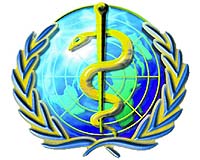 |
Washington (AFP) Nov 18, 2010 The deadly cholera epidemic in Haiti is virulent and unpredictable, and repeated outbreaks could wreak havoc for years to come, US officials and health experts warned on Thursday. "This strain of cholera seems to be more virulent than normal strains," Thomas Adams, the special US coordinator for Haiti, told reporters. "The disease fooled us," added Adams, saying a cholera outbreak was feared likely in the impoverished Caribbean nation following January's deadly earthquake, but most expected it to break out in the capital Port-au-Prince. More than 1,100 people have died from the diarrhea-causing illness since it emerged in central and northern parts of the country last month, with more than 18,000 people infected. A case of cholera has also been found in both the neighboring Dominican Republic and the US state of Florida. Both victims traveled from Haiti. "The course of the cholera outbreak in Haiti is difficult to predict," the the US-based Centers for Disease Control said in a report on the progress of the disease and efforts to stop its deadly course. "The Haitian population has no preexisting immunity to cholera, and environmental conditions in Haiti are favorable for its continued spread," it said. "Longer-term persistence of (the bacterium) V. (Vibrio) cholerae in the environment in Haiti and recurrent cholera outbreaks also are possible." While the initial source of the bacteria-based disease was likely contaminated water in the Artibonite River, future outbreaks could result from tainted food, the CDC said. "Risk factors for illness might change as the outbreak expands over time. Contamination of food by persons who are ill, either via the use of contaminated water or poor food preparation hygiene also can contribute to the spread of disease." Haiti has long suffered from dismal sanitation and polluted drinking water, a situation that worsened after the devastating 7.0 earthquake in January that displaced more than a million people and killed 250,000. Just 17 percent of Haiti's population had access to adequate sanitation prior to the earthquake, which damaged many of the nation's treated water facilities and piped water distribution systems, the CDC said. The CDC and other agencies are trying to widely distribute prepackaged oral rehydration solutions so that local residents can drink the safe fluids at the first sign of symptoms and hopefully ward off the deadly dehydration that cholera can cause. But the harsh reality of life in the overpopulated tent camps around the capital and beyond, in addition to periodic riots as anger and frustration mount, means aid workers will face an uphill climb. "The number of cases might be lowered substantially if efforts to reduce transmission are implemented fully, but they also might be increased substantially by delays in implementation, flooding, or other disruptions," the CDC said. Manoj Menon, the CDC liaison for the US cholera response, told reporters that health officials could not rule out rumors that poor sanitation at a UN peacekeeping compound caused the outbreak. "We will likely never know where this came from," he said, pointing out the difficulties in pinpointing the source of the disease. But experience shows that cholera has an increased chance of spreading in countries where infant mortality is high, such as in Haiti, he added. "We hope that given the current preventive and treatment measures we have... the biggest burden will be early on in the epidemic, and that's what's we're seeing now," Menon said. "But we expect that cases will continue and the organism will be present in the environment for a number of years."
Share This Article With Planet Earth
Related Links Epidemics on Earth - Bird Flu, HIV/AIDS, Ebola
 WHO says flu risk assessment unchanged after Hong Kong case
WHO says flu risk assessment unchanged after Hong Kong caseGeneva (AFP) Nov 18, 2010 The World Health Organisation said Thursday that it was not changing its risk assessment on avian flu, even though Hong Kong reported its first human case of infection in seven years. "Our risk assessment has not changed," said Gregory Hartl, spokesman of the WHO. "This would fit the existing pattern of occasional human infection," he added. Hong Kong earlier Thursday said a 59-year- ... read more |
|
| The content herein, unless otherwise known to be public domain, are Copyright 1995-2010 - SpaceDaily. AFP and UPI Wire Stories are copyright Agence France-Presse and United Press International. ESA Portal Reports are copyright European Space Agency. All NASA sourced material is public domain. Additional copyrights may apply in whole or part to other bona fide parties. Advertising does not imply endorsement,agreement or approval of any opinions, statements or information provided by SpaceDaily on any Web page published or hosted by SpaceDaily. Privacy Statement |